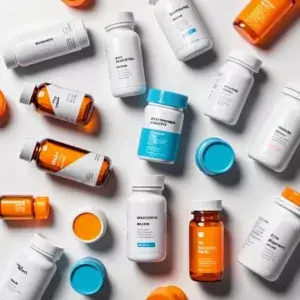Table of Contents
In today’s fast-paced environment, maintaining a healthy mood is critical for general well-being and productivity. While stress, worry, and mood swings are typical, nootropics—natural or synthetic compounds that improve cognitive function—present a viable solution for mood enhancement. In this post, we’ll look at how nootropics can boost your mood, go over some of the most powerful mood boosters, and highlight products that include these compounds.
How Nootropics Improve Mood
Nootropics for mood enhancement operate via a variety of pathways, including neurotransmitter modulation, stress reduction, and neuroprotection. Nootropics work by changing brain chemicals and circuits to help regulate emotions, reduce anxiety, and create a sense of well-being.
1. Neurotransmitter modulation
Neurotransmitters are chemicals in the brain that carry signals between neurons. They help regulate mood. Nootropics improve mood by regulating the levels and activity of neurotransmitters such as serotonin, dopamine, and GABA.
Serotonin: Also known as the “happiness neurotransmitter,” serotonin is essential for mood control. Nootropics such as 5-HTP and St. John’s Wort increase serotonin levels, resulting in enhanced mood and fewer symptoms of depression.
Dopamine: Linked to pleasure, motivation, and reward. Nootropics such as L-Tyrosine and Mucuna Pruriens increase dopamine production, which can help reduce feelings of lethargy and despair.
GABA: GABA (gamma-Aminobutyric Acid) is a neurotransmitter that promotes relaxation and reduces anxiety. Nootropics like phenibut and L-theanine boost GABA activation, resulting in a calmer, more relaxed state.
2. Stress reduction and adaptogens
Chronic stress is a major contributor to mood disorders like anxiety and depression. Adaptogens are a type of nootropic that helps the body adapt to stress by controlling the production of stress hormones such as cortisol.
Ashwagandha: An adaptogen widely used in traditional medicine, Ashwagandha helps reduce cortisol levels, promote relaxation, and reduce anxiety.
Rhodiola Rosea: Another potent adaptogen, Rhodiola Rosea, boosts the body’s resistance to stress, increasing mood and decreasing fatigue.
L-Theanine: Found in tea leaves, L-Theanine promotes relaxation without making you drowsy. It’s especially helpful when used with caffeine, as it can reduce the jitteriness that comes with caffeine consumption.
3. Neuroprotection.
Oxidative stress and inflammation can impair mood by destroying neurons and altering neurotransmitter activity. Nootropics with neuroprotective characteristics aid in protecting the brain from these consequences, promoting a stable mood.
Phosphatidylserine (PS): This phospholipid promotes brain health by protecting cell membrane integrity and lowering oxidative stress, both of which are necessary for maintaining a stable mood.
Resveratrol: Known for its antioxidant properties, Resveratrol helps protect the brain from oxidative damage, thereby promoting mental clarity and a positive mood.
Omega-3 Fatty Acids (EPA/DHA): These important fatty acids have potent anti-inflammatory characteristics and are critical for brain function. They play an important role in mood regulation, and omega-3 deficiency is linked to mood disorders like depression.
Essential Nootropics for Mood Enhancement
Let’s take a deeper look at some of the best nootropics for mood enhancement:
1. 5-HTP: 5-HTP, a precursor to serotonin, increases serotonin levels in the brain, which helps to enhance mood and alleviate symptoms of depression and anxiety.
2. Ashwagandha: As a powerful adaptogen, Ashwagandha lowers cortisol levels and helps the body regulate stress, resulting in enhanced mood and emotional resilience.
3. L-Theanine: Promotes relaxation and decreases anxiety without inducing drowsiness, making it perfect for people who need to stay focused while dealing with stress.
4. Rhodiola Rosea: Increases the body’s stress resistance, reduces weariness, and promotes a healthy mood.
5. St. John’s Wort: St. John’s Wort is known for its antidepressant properties, which enhance serotonin levels and aid in alleviating depressive symptoms.
6. L-Tyrosine: L-Tyrosine, a precursor to dopamine, increases dopamine levels, which improves mood, motivation, and focus.
7. Phenibut: Phenibut, a GABA derivative, improves relaxation and decreases anxiety, making it useful for treating stress-related mood problems.
8. Mucuna Pruriens: L-DOPA, a precursor to dopamine, improves mood and motivation by raising dopamine levels in the brain.
9. Phosphatidylserine (PS): Protects neurons from oxidative stress, which promotes overall brain health and mood stability.
10. Resveratrol: An antioxidant that protects the brain from oxidative damage, promoting mental clarity and a positive mood.
The Best Nootropic Supplements for Mood Enhancement
If you want to boost your mood with nootropics, try these nootropic stacks, which combine mood-enhancing ingredients:
Mind Lab Pro:
This comprehensive nootropic stack comprises L-Theanine, Rhodiola Rosea, and Phosphatidylserine, which help with mood, focus, and overall cognitive performance.
Qualia Mind:
Known for its diverse constituents, Qualia Mind contains L-Theanine, Rhodiola Rosea, and Ashwagandha, providing a broad-spectrum approach to mood improvement and stress reduction.
Onnit New Mood:
Specifically developed to boost relaxation and mood, this supplement contains 5-HTP, L-Theanine, and Ashwagandha, making it a perfect choice for people trying to reduce stress and improve their emotional well-being.
Neurohacker Collective’s Qualia Night:
This supplement promotes relaxation and sleep quality with substances such as L-Theanine, Ashwagandha, and 5-HTP, which also aid in improving mood by reducing stress and encouraging calm.
Mood Boosting Nootropics
Mood has a significant impact on our general well-being, influencing how we see the environment and interact with others. Nootropics provide a natural and effective way to improve mood by modifying neurotransmitters, lowering stress, and protecting the brain from oxidative damage. Whether you’re coping with occasional stress or trying to maintain a consistently cheerful attitude, the appropriate nootropic combo can make a big difference.
Introducing mood-boosting nootropics into your daily routine, whether through individual supplements or nootropic stacks, can improve your emotional well-being and quality of life. As usual, contact your doctor before beginning any new supplement program, especially if you have underlying health concerns or are taking other medications.
With the correct approach, nootropics for mood can help you achieve a balanced and positive state of mind, helping you to deal with life’s obstacles more easily and resiliently.
Resources
5-HTP and Mood Regulation:
- Shaw, K., et al. (2002). 5-hydroxytryptophan for depression: A systematic review. Cochrane Database of Systematic Reviews, Issue 1. Link
Ashwagandha and Stress Reduction:
- Chandrasekhar, K., et al. (2012). A prospective, randomized double-blind, placebo-controlled study of safety and efficacy of a high-concentration full-spectrum extract of Ashwagandha root in reducing stress and anxiety in adults. Indian Journal of Psychological Medicine, 34(3), 255-262. Link
L-Theanine and Relaxation:
- Nathan, P. J., et al. (2006). The neuropharmacology of L-theanine (N-ethyl-L-glutamine): A possible neuroprotective and cognitive enhancing agent. Journal of Herbal Pharmacotherapy, 6(2), 21-30. Link
Rhodiola Rosea and Stress Adaptation:
- Panossian, A., & Wikman, G. (2009). Evidence-based efficacy of adaptogens in fatigue, and molecular mechanisms related to their stress-protective activity. Current Clinical Pharmacology, 4(3), 198-219. Link
St. John’s Wort and Depression:
- Linde, K., et al. (2008). St John’s wort for major depression. Cochrane Database of Systematic Reviews, Issue 4. Link
L-Tyrosine and Dopamine:
- Jongkees, B. J., et al. (2015). The effect of tyrosine on cognitive performance: Systematic review and meta-analysis of randomized controlled trials. Journal of Psychiatric Research, 69, 50-57. Link
Phenibut and Anxiety Reduction:
- Lapin, I. (2001). Phenibut (beta-phenyl-GABA): A tranquilizer and nootropic drug. CNS Drug Reviews, 7(4), 471-481. Link
Mucuna Pruriens and Dopamine:
- Katzenschlager, R., et al. (2004). Mucuna pruriens in Parkinson’s disease: A double-blind clinical and pharmacological study. Journal of Neurology, Neurosurgery & Psychiatry, 75(12), 1672-1677. Link
Phosphatidylserine and Mood:
- Glade, M. J. (2010). Phosphatidylserine: A natural aid to cognitive function. Nutrition, 26(7-8), 920-923. Link
Resveratrol and Brain Health:
- Kennedy, D. O., et al. (2010). Effects of resveratrol on cerebral blood flow variables and cognitive performance in humans: A double-blind, placebo-controlled, crossover investigation. American Journal of Clinical Nutrition, 91(6), 1590-1597. Link
Omega-3 Fatty Acids and Depression:
- Grosso, G., et al. (2014). Omega-3 fatty acids and depression: Scientific evidence and biological mechanisms. Oxidative Medicine and Cellular Longevity, 2014. Link





